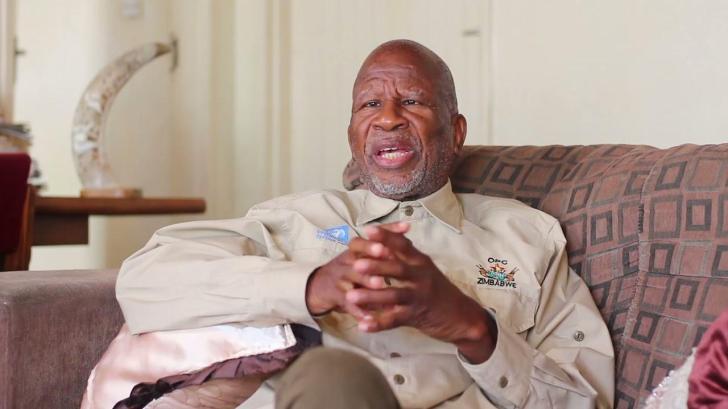News / National
Matebeleland chiefs shower praises on late historian
06 Nov 2024 at 06:53hrs |
0 Views

Chiefs from Matebeleland and Midlands provinces have paid heartfelt tributes to the late historian and author, Mr. Pathisa Nyathi, who passed away on Saturday at 73 after a prolonged illness. Known for his extensive work in documenting Zimbabwe's rich cultural heritage and correcting historical narratives, Nyathi's death is being mourned as a profound loss for the nation.
President Mnangagwa, expressing sorrow over Nyathi's death, has granted him a State-assisted funeral in recognition of his contributions to preserving Zimbabwean history. The President of the Chiefs Council of Zimbabwe, Chief Mtshane Khumalo of Bubi, described Nyathi as "a fountain of knowledge" whose work had been instrumental in recording historical accounts of Matabeleland, especially around the Pupu Shrine and the legacy of King Lobengula.
"It's difficult to accept his passing," Chief Mtshane said. "Losing someone like Nyathi, who was deeply knowledgeable about Zimbabwe's past, leaves a void not easily filled." He also commended the government for recognizing Nyathi's contributions through the State-assisted funeral, affirming that the historian was essential to nation-building.
Chief Dakamela of Nkayi, who collaborated with Nyathi in cultural preservation efforts, described him as "an anchor of heritage" whose historical insights enlightened communities. Earlier this year, at an annual cultural event, Imiklomelo KaDakamela, Nyathi presented research on King Lobengula's grave site, attracting over 5,000 attendees. "This is a huge loss," Chief Dakamela said, emphasizing that Nyathi's books will continue to be consulted for their rich content on history and culture.
Chief Masendu from Bulilima District praised Nyathi's dedication to cultural preservation. "He worked closely with traditional leaders, helping us understand our cultural roots," he said, underscoring the importance of upholding Nyathi's work, particularly in a rapidly modernizing society.
Chief Masuku of Gwanda echoed these sentiments, stressing that Nyathi's work has left an enduring legacy. "His writings documented how we lived in the past and offered guidance for the future. We have lost a valuable custodian of our traditions and identity," he remarked, encouraging all Zimbabweans, especially young people, to read Nyathi's books.
Chief Bango of Mangwe emphasized the necessity of preserving traditional values and respecting historians like Nyathi who safeguard these cultural pillars. Chief Ngungumbane of Mberengwa also shared his admiration, noting how Nyathi valued national unity over tribal identity, bringing diverse cultural insights to the broader Zimbabwean narrative.
Reflecting on Nyathi's legacy, Chief Ngungumbane said, "He leaves behind a lesson of identifying as Zimbabwean first. His scholarship spanned across many tribes, speaking volumes of his inclusive vision." Nyathi's efforts in promoting traditional governance, he added, revealed a deep understanding of Zimbabwe's indigenous systems, which he believed could resolve regional challenges.
Nyathi's influence, as highlighted by traditional leaders, has been profound. His dedication to accurate historical representation and cultural preservation leaves an indelible mark on Zimbabwe. His published works, documenting histories often neglected in mainstream narratives, will continue to serve as essential resources for future generations.
President Mnangagwa, expressing sorrow over Nyathi's death, has granted him a State-assisted funeral in recognition of his contributions to preserving Zimbabwean history. The President of the Chiefs Council of Zimbabwe, Chief Mtshane Khumalo of Bubi, described Nyathi as "a fountain of knowledge" whose work had been instrumental in recording historical accounts of Matabeleland, especially around the Pupu Shrine and the legacy of King Lobengula.
"It's difficult to accept his passing," Chief Mtshane said. "Losing someone like Nyathi, who was deeply knowledgeable about Zimbabwe's past, leaves a void not easily filled." He also commended the government for recognizing Nyathi's contributions through the State-assisted funeral, affirming that the historian was essential to nation-building.
Chief Dakamela of Nkayi, who collaborated with Nyathi in cultural preservation efforts, described him as "an anchor of heritage" whose historical insights enlightened communities. Earlier this year, at an annual cultural event, Imiklomelo KaDakamela, Nyathi presented research on King Lobengula's grave site, attracting over 5,000 attendees. "This is a huge loss," Chief Dakamela said, emphasizing that Nyathi's books will continue to be consulted for their rich content on history and culture.
Chief Masuku of Gwanda echoed these sentiments, stressing that Nyathi's work has left an enduring legacy. "His writings documented how we lived in the past and offered guidance for the future. We have lost a valuable custodian of our traditions and identity," he remarked, encouraging all Zimbabweans, especially young people, to read Nyathi's books.
Chief Bango of Mangwe emphasized the necessity of preserving traditional values and respecting historians like Nyathi who safeguard these cultural pillars. Chief Ngungumbane of Mberengwa also shared his admiration, noting how Nyathi valued national unity over tribal identity, bringing diverse cultural insights to the broader Zimbabwean narrative.
Reflecting on Nyathi's legacy, Chief Ngungumbane said, "He leaves behind a lesson of identifying as Zimbabwean first. His scholarship spanned across many tribes, speaking volumes of his inclusive vision." Nyathi's efforts in promoting traditional governance, he added, revealed a deep understanding of Zimbabwe's indigenous systems, which he believed could resolve regional challenges.
Nyathi's influence, as highlighted by traditional leaders, has been profound. His dedication to accurate historical representation and cultural preservation leaves an indelible mark on Zimbabwe. His published works, documenting histories often neglected in mainstream narratives, will continue to serve as essential resources for future generations.
Source - the chronicle
Join the discussion
Loading comments…










































